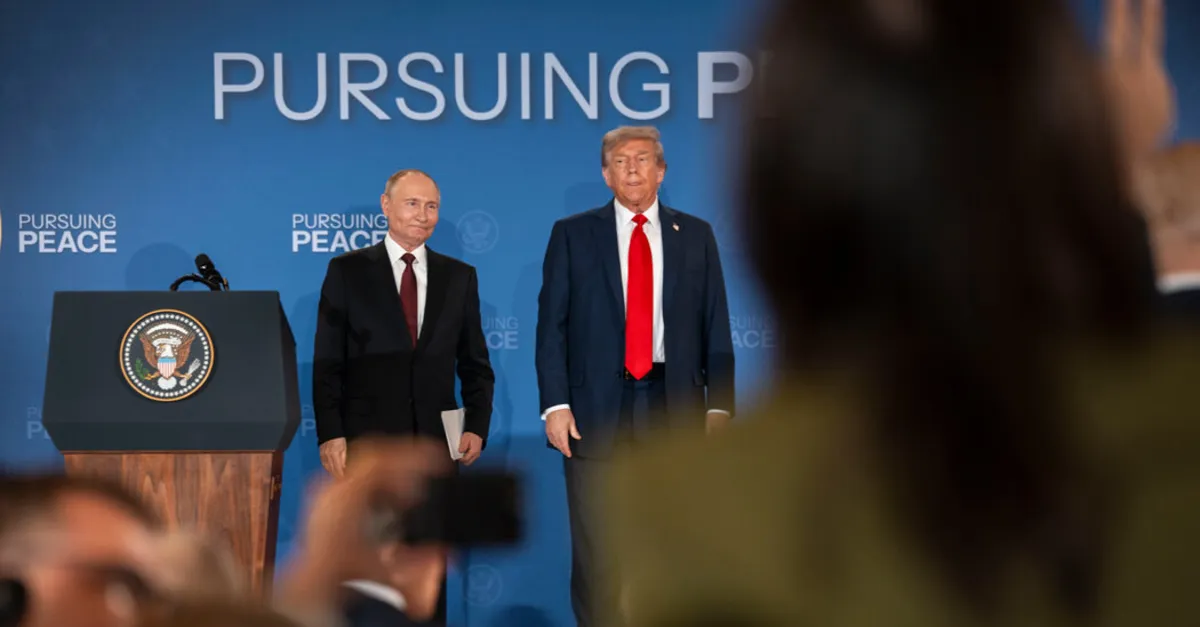
During a recent meeting in Alaska, former President Donald Trump and Russian President Vladimir Putin failed to reach an agreement on a cease-fire regarding the ongoing war in Ukraine. However, they did find common ground in their mutual disdain for President Joe Biden. In both their private discussions and public appearances in Anchorage, both leaders pointed fingers at Mr. Biden, attributing the escalation of the conflict to his policies, despite the fact that it was Putin who initiated the invasion of Ukraine and continues to target civilian areas.
During the meeting, Putin expressed grievances regarding Biden's refusal to meet Russian demands prior to the full-scale invasion that occurred three and a half years ago. He even went so far as to suggest that the war might not have taken place had Trump remained in office during 2022. In his post-summit interview with Fox News, Trump claimed that Putin acknowledged his belief that the conflict would have been avoided with a "competent president," referring to himself. "He respects our country now," Trump stated, contrasting it with the perceived disrespect he believes Putin shows towards Biden.
While Trump has voiced frustration with Putin leading up to the Alaska meeting, he has consistently refrained from criticizing the Russian leader as harshly as he does Biden, former President Barack Obama, or even former President George W. Bush. This selective criticism highlights a peculiar dynamic; while Putin has longstanding grievances against multiple U.S. presidents, he seems to view Trump differently. Analysts suggest that this shared animosity toward Biden created a moment of convergence between the two leaders during their Alaska encounter.
Putin, a former K.G.B. officer, is known for his ability to adapt his approach based on the personalities of those he engages with. He meticulously researches and understands what matters to his counterparts, often leveraging their vulnerabilities to gain an advantage. For instance, during a meeting with former Chancellor Angela Merkel, who has a fear of dogs, Putin brought his black Labrador to the meeting, which Merkel interpreted as a power play.
In meetings with Trump, Putin has displayed an understanding of the former president's insecurities and need for validation. During a 2019 meeting in Japan, Trump boasted about military bases named after him, to which Putin humorously suggested that Israel should be named after him as well. This familiarity suggests that Putin knows how to flatter Trump, which he likely employed during their discussions in Alaska.
Putin's remarks during the meeting, claiming he had tried to warn Biden to avoid escalating tensions, overlook the fact that the current conflict began in 2014 with the annexation of Crimea. The war continued throughout Trump's presidency, and while some Democrats argue that Trump would have allowed Putin to dominate Ukraine without military intervention, Trump's narrative frames the conflict as "Biden's war," deflecting blame from his own administration's inaction.
In a twist of events, Trump recounted how Putin allegedly supported his claims of a rigged 2020 election, suggesting that mail-in voting led to his defeat. This claim, however, is not substantiated by evidence; numerous countries, including Russia, permit mail-in voting. Trump's assertions serve to reinforce his narrative while casting doubt on the legitimacy of the election process, yet independent investigations have found no evidence of widespread fraud that could have affected the election outcome.
The meeting between Trump and Putin in Alaska underscores the complexities of U.S.-Russia relations and the interplay of personal dynamics between leaders. While they may share a common adversary in President Biden, it’s crucial to recognize the broader context of the ongoing war in Ukraine and the historical events that have shaped these relationships. As political tensions continue to evolve, the narratives constructed by leaders like Trump and Putin will significantly impact public perception and international diplomacy.